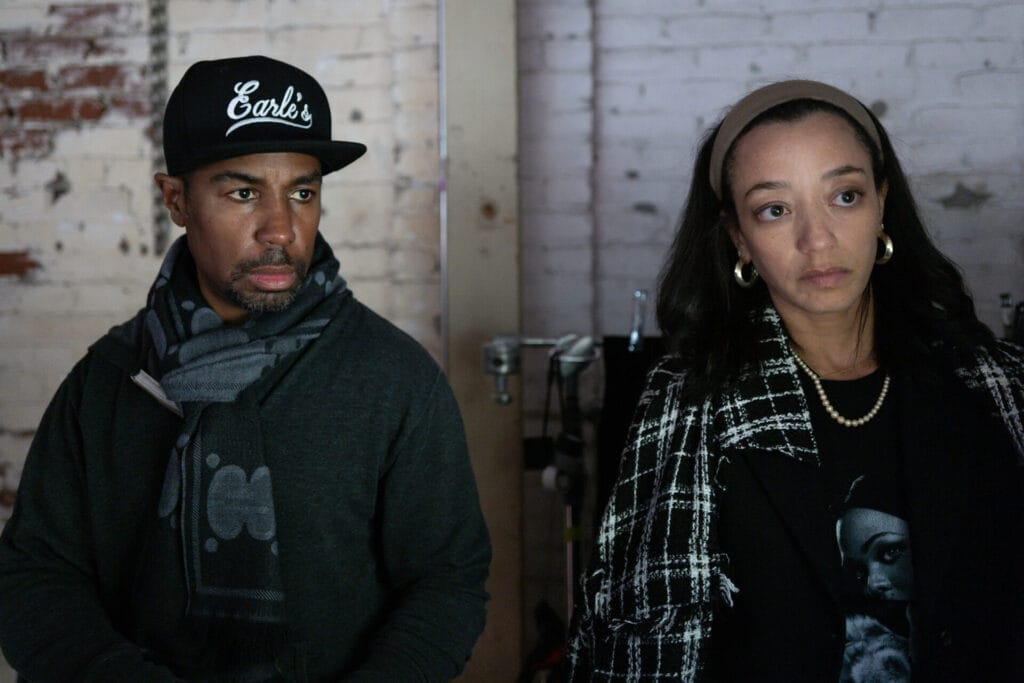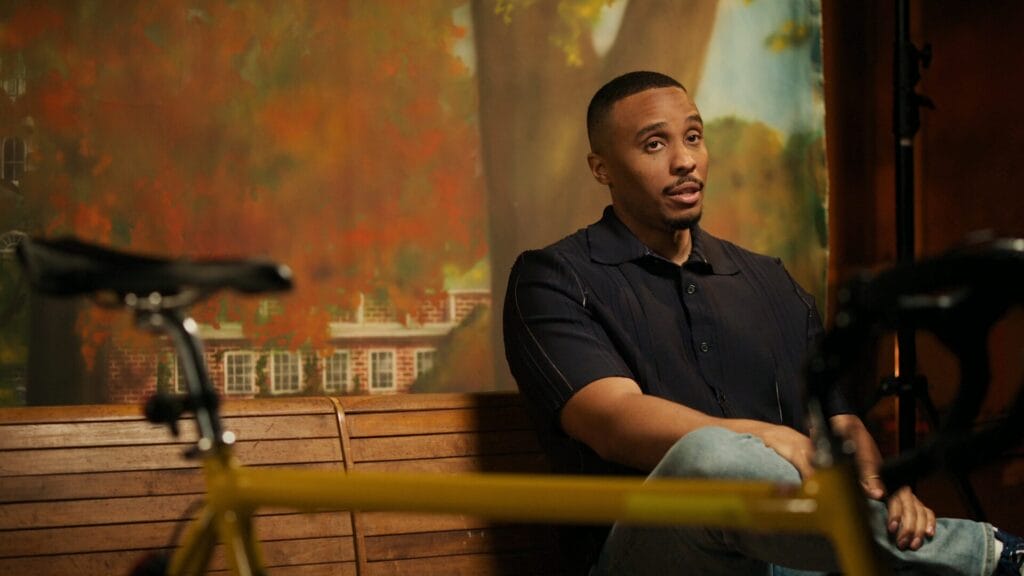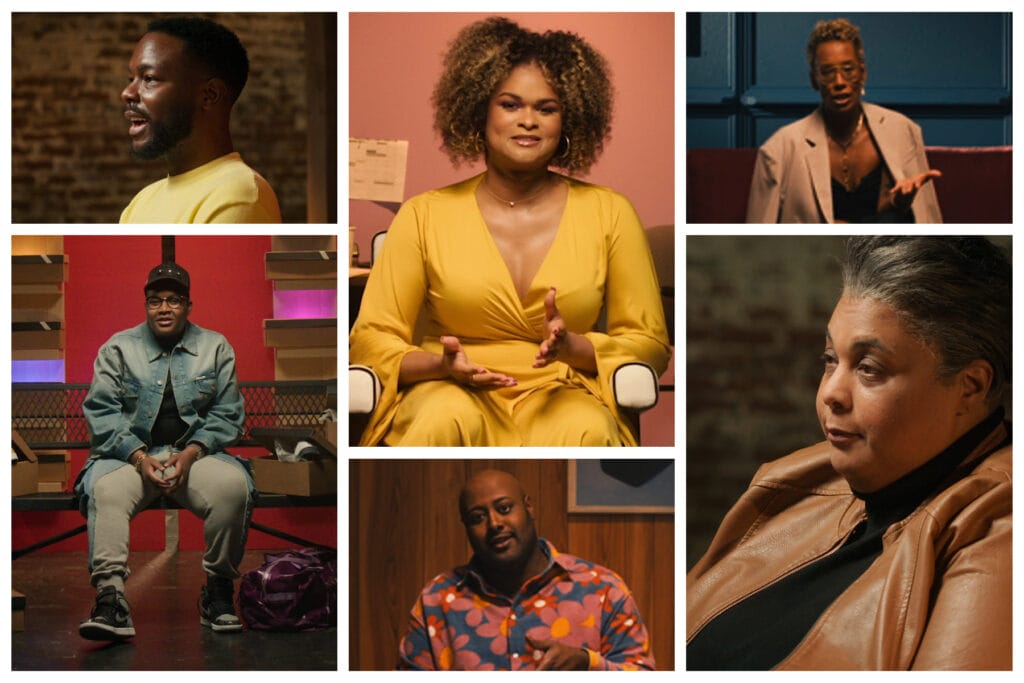On May 9, Hulu debuted the new three-part docuseries Black Twitter: A People’s History from former Insecure showrunner Prentice Penny (Director, Executive Producer), Joie Jacoby (Showrunner, Executive Producer), and Jason Parham (Producer), who wrote the Wired cover story on which it is based.
The docuseries, which bowed earlier this year at SXSW, charts the rise, movements, voices, and memes that made Black Twitter an influential and dominant force in nearly every aspect of American political and cultural life.
Prominent LGBTQ figures in media including Roxane Gay, Sam Jay, Ira Madison III, Kid Fury, Raquel Willis, and J Wortham as the series discusses the impact the social media platform has had on Black women as well as the LGBTQ community. They also go into how Twitter has treated Black women and queer people.
GLAAD had the opportunity to talk to Penny, Jacoby, and Parham about this oral history of Black Twitter and how it preserves a moment in Black History.
Where did the initial seed come from?
JASON PARHAM: The term originally started after Black Twitter started getting some media attention around 2009 There was a particular hashtag #TwitterAfterDark – you know, around 11 o’clock at night… particularly, it was Choire Sicha at The Awl. I remember when the article came out, he was like “What are Black people doing late at night on Twitter?” and then from there, more and more people started to write about it: Slate, New York Times — it became Black Twitter through a media lens, but to us it was just Twitter. I remember when I originally did my reporting for Wired, a lot of people like Tracy Clayton and Brandon James were saying it was just Twitter for us. This was just us showing up and having fun with our friends. It was a lens that the media put on it but we adapted it and you know made it our own as we usually do.
When did you realize Black Twitter was just more than a place to virtually meet up?
JOIE JACOBY: Definitely when we saw social movements: Black Lives Matter, Ferguson – those were completely mobilized by Twitter. We talked about Trayvon also but then you see later things that happened like #OscarsSoWhite and the #MeToo movement – both of those were started in Black Twitter.
PRENTICE PENNY: When you watch the first part of the doc, you start to see how these blobs start to form. To me, it’s also like moments before the social justice movement — even mobilizing to support Scandal, right? We’re all doing these things over here but then we’re all gathered collectively to support this show. As a result, you’re seeing that group is helping push the show’s ratings up. Those kinds of things and things like Zola start to form a community that is doing something organically fun and they take that same energy and put it towards organizing a march around Trayvon, or calling out the hypocrisy because that’s the thing that Black people do in their own siloed communities.
This is explored in the docuseries, but when Twitter pivoted and became X, things started to shift. It was no longer the Twitter we loved. Although many folks have stayed on the platform, many have divested to other alternatives like Threads, Spill, or Bluesky. How do you think Black Twitter will navigate this?
PARHAM: We’re at an inflection point and sort of the next phase of social media. I think a lot of people are moving to smaller siloed communities. So you see Spill — there are people on there doing their thing. I just don’t think you’re gonna see a lot of people together in one place anymore. Everything’s a lot more fractured, a lot more segmented. Almost like the early days of the internet. When you had smaller communities speaking to each other.
Because of Black Twitter’s influence, it sort of changed the course of social media. This documentary is a legacy of Black Twitter. You have people from Black Twitter on TV shows; in the news; in the media; writing TV — it always was bigger than itself. But now it’s like you can see the fruits of its labor.
PENNY: To Jason’s point right, this sort of birth of Black Twitter being around the Obama era – there was an optimism around this. I think Black people felt more free and were like, “Oh, we can kind of say things and talk about things” and I think now, after the rise of Trump and the alt-right, it was a huge response to the Obama era.
Black Twitter and Twitter, in general, was this sort of fun Public Square and now as Jason said, it’s getting back to more siloed communities because the world is more fractured. The world doesn’t want to hear it. Everyone is saying “I don’t want to hear what you have to say” and “I only want to hear what I have to say”, right? We’re kind of moving that way as a country. I think the way that we use social media is just a representation of how we’re moving in the world.


The third episode goes into LGBTQ Black Twitter. Can you speak to how Black Twitter spoke to the Black queer community?
PENNY: One of the things that Black Twitter did was let us call “Karens” out and hold people’s institutions accountable post-January 6. We need to also hold Black Twitter accountable for the way that it is problematic and toxic towards Black women, trans people, and the gay community. It wouldn’t be right if we weren’t also holding a mirror back to ourselves and going, “Yeah, exactly.” It needs to be a huge part of that.
Meredith Clark said that typically in the past when we were talking about the Black community, we were talking about the Black community for people who were outside of that community — but that isn’t how the Black community describes itself. There is this thing, even with our community, which we start to do: “What is Black what is not?“ Who gets to participate in the conversation? Who doesn’t get to participate in the conversation? We have our issues of marginalizing our margin and so we felt we did need to hold that accountable because it can’t just can’t be amazing all the time. If we’re keeping it real for “Karen”, we got to keep it real for ourselves.
JACOBY: I think that it’s a really interesting way of looking at what I think will go down in history as some of the most transformative years in our country; from Obama to Trump. The last 16 years or so has been a trip and it’s defined and changed the fabric of our country in so many different ways in the way that we communicate with each other. And the idea that there was this platform happening at the exact same time – for me, it was just so cool to be able to tell history through that lens and our community lens.
PENNY: So many things in the digital space are here today, gone tomorrow, right? You don’t know what’s going to be around. I felt like it was the right time to document [Black Twitter]. Our history is often erased or rewritten. What I find so interesting about this is much of Black culture in this country is oral. We don’t have books on Ellis Island when we got here, right? We don’t have all this written down history. We weren’t allowed to read or write or even keep records of that. Since Black Twitter happened in a digital space, that could also be removed too. My kids would have to learn about Black Twitter as an oral tradition. When the trailer dropped there was a lot of response on Black Twitter being like super skeptical, and I get that. Because so much of our history, especially in media is often not told to us with a narrative that seems accurate; not told with any truth; and it’s not told with any love right, and realness. I get everybody’s fears — but the reason why we did it is because we don’t have a lot of documentation of our culture in America. So if we don’t do it for this, then what do we leave behind? How do we show we were here? How does that represent to our future children and grandchildren of what we brought to this country?
I get the skepticism but I really hope people view it from that lens. We’re doing it because it could all be erased and if the people who are present don’t say it now, when will we say it?













